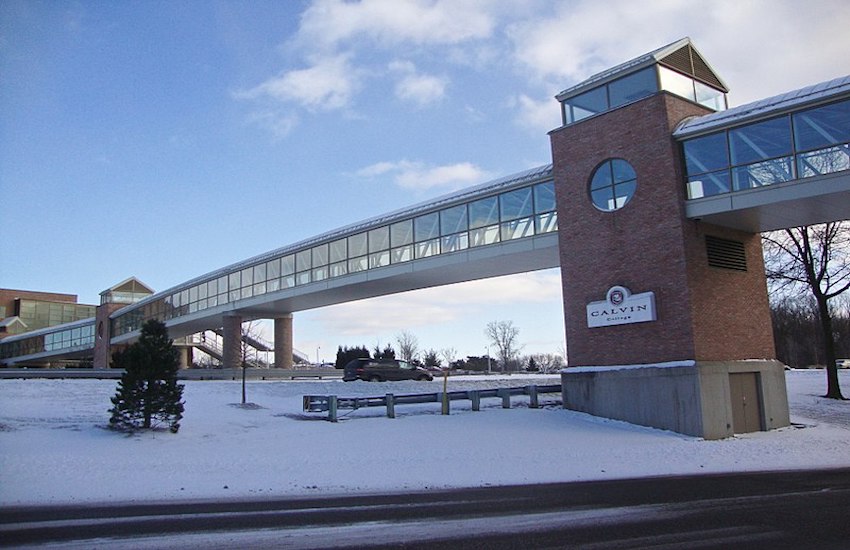Conservative Christian colleges in America are becoming increasingly entangled with the issue of LGBTI rights, according to NPR.
Though students and faculty at many of these institutions are required to accept a ‘faith statement,’ often which condemns homosexuality, social and cultural shifts are making it hard for these conservative schools to ensure total compliance of the rules.
The Younger Generations
‘Millennials are looking at the issue of gay marriage, and more and more they are saying, “OK, we know the Bible talks about this, but we just don’t see this as an essential of the faith,”’ says Brad Harper, a professor of theology and religious history at Multnomah University, an evangelical Christian institution in Portland, Oregon.
In fact, many LGBTI students at these institutions are more likely to be open about their sexual orientation or gender identity.
‘People I’ve met in the English Department [are tolerant],’ says Sam Koster, a junior at Calvin College in Grand Rapids, Michigan. ‘Even in my dorms, they’re like, “Oh, you’re queer? OK, cool. Do you want to go get pizza?”’
‘You’ve got those two values,’ explains Mary Hulst, senior chaplain at Calvin. ‘We love our LGBT people. We love our church of Jesus Christ. We love Scripture. So those of us who do this work are right in the middle of that space. We are living in the tension.’
Calvin College is affiliated with the Christian Reformed Church, which believes ‘Homosexualism (that is, explicit homosexual practice)… is incompatible with obedience to the will of God as revealed in Scripture.’
Regardless, Hulst still holds bible study groups with LGBTI students where they discuss the passages that mention same-sex relationships.
‘Those are the clobber passages,’ Koster says of those parts of the bible. ‘They’re used to clobber queer kids back into being straight.’
‘When I realized that my faith wasn’t necessarily about the [Christian Reformed] Church, and it wasn’t even necessarily about the Bible but about my relationship with God and that God is all-encompassing and loving, I felt very free,’ Koster, who has joined the Gay Christian Network, says.
Legal Woes
Cultural and social shifts aren’t the only thing forcing conservative Christian institutions to alter their ways. Legal entanglements are also playing a role.
Title VII of the 1964 Civil Rights Act prohibits employment discrimination on the basis of ‘race, color, religion, sex, or national origin.’
Though Title VII doesn’t explicitly refer to gender identity or sexual orientation, many courts have recently decided the law does, in fact, protect LGBTI individuals.
Then there’s Title IX of the Higher Education Amendments of 1972. This law states that ‘no person in the United States shall, on the basis of sex, be excluded from participation in, be denied the benefits of, or be subjected to discrimination under any education program or activity receiving Federal financial assistance.’
In 2016, the Obama administration notified colleges and universities that sexual orientation and gender identity are included under Title IX.
‘As a condition of receiving Federal funds, a school agrees that it will not exclude, separate, deny benefits to, or otherwise treat differently on the basis of sex any person in its educational programs or activities unless expressly authorized to do so under Title IX or its implementing regulations,’ the letter sent to colleges reads.
‘The Departments treat a student’s gender identity as the student’s sex for purposes of Title IX and its implementing regulations. This means that a school must not treat a transgender student differently from the way it treats other students of the same gender identity. The Departments’ interpretation is consistent with courts’ and other agencies’ interpretations of Federal laws prohibiting sex discrimination.’
Exemptions
However, upon taking office in 2017, the Trump administration rescinded this directive. Still, many conservative Christian schools feel the social shift towards acceptance of LGBTI individuals would still be enough for them to have to change their policies.
Currently, educational institutions can apply for Title VII exemptions by demonstrating that those provisions contradict their religious beliefs. Yet, those exemptions may or may not protect institutions which seek to maintain a strict policy regarding sexual orientation.
‘Religious exemptions are exemptions because they are for small groups of people, and it doesn’t necessarily undermine the full purpose of the law to have them,’ says Shapri LoMaglio, vice president for government affairs at the Council for Christian Colleges and Universities. ‘I think case law is upholding the idea that that exemption is the right thing in order to be faithful to the Constitution.’
‘Four years down the line, eight years down the line, depending on the makeup of the Supreme Court, depending on who is president, I can see the gay/transgender issue being pushed in a way that would seek to make Christian colleges either surrender their federal funding or change their position and conform with the wider consensus,’ believes Carl Trueman, a professor of church history at Westminster Theological Seminary in Pennsylvania.
Many of these conservative Christian institutions fear their government funding and/or tax-exempt status could be revoked.
‘The fear is so large in many institutions because 40 or 50 or maybe even 60 percent of their budgets are really coming from the federal government,’ says Dale Kemp, the chief financial officer at Wheaton College in Illinois. ‘To think they could survive without that [funding] would be catastrophic.’







